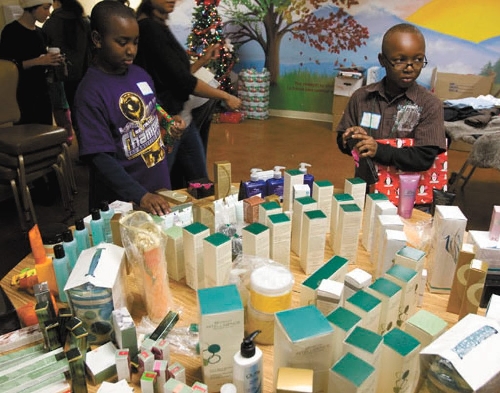Shelter’s smiles are few

The 11-year-old boy doesn’t once crack a smile during a nearly two-hour early Christmas celebration at The Shade Tree shelter.
Not while carefully choosing presents for his mother from tables full of donated perfumes, handbags, jewelry and gloves. He settles, with a decisive nod, on a robe and some sandals.
Not while quietly informing Santa that what he really wants this year is a portable DVD player and a CD player, impossible gifts for his mother, who sits by, shaking her head.
And not while chasing his brothers and sisters around the shelter’s ground floor, helping his mother keep an eye on the brood.
As the eldest of six siblings, the boy best understands the grim direction his family’s life has taken. They are living in a homeless shelter for Christmas.
“It’s not very good,” he says with a scowl.
Then he makes an effort to be more positive.
“It’s kinda OK,” he says. “My mom’s going to get a job soon. We’ll only be here one more month.”
Meanwhile, he and his siblings are among the 100 or so children, ranging in age from 2 weeks to 16 years old, who are spending the holidays in the shelter for women and children.
They and their mothers have landed here for one of two reasons: economics or abuse.
Each holiday, the shelter sees the number of women and children seeking shelter rise, especially the number of those who are fleeing abusive situations, says Marlene Richter, the shelter’s executive director.
“All of them have a harder time on the holidays,” she explains. “There’s more stress. There’s more alcohol and partying, more expectations. The children are out of school.”
This holiday, about a third of the shelter’s 210 women are running from abusive relationships.
Shelter staffers, with the help of a lot of volunteers, do their best to create an abundance of holiday cheer. The partying begins a week or so before Christmas, with presents and treats and an early visit from Santa.
On Christmas Eve, there is cookie decorating, karaoke, movies and hot chocolate. Early Christmas morning, Santa magically appears simultaneously on each of the shelter’s three floors.
The residents get to enjoy an all-day holiday feast. It’s organized chaos. But shelter staffers also make sure they “leave some quiet space somewhere in the building, in case the women can’t handle it,” Richter says.
For some women, the scars are too raw to feel like celebrating. For others who may be separated from their children or otherwise alone, watching young ones opening gifts may be too painful.
The children themselves express predictable yet heartbreaking holiday concerns based on their individual circumstances.
If they are in shelter because of abuse in the home, “they really miss being in the house they had and the traditions they had,” Richter says.
If they are in shelter for economic reasons, “they are surprised Santa remembered them at all,” she says.
The 11-year-old’s mother sits cradling her 1-year-old daughter, her youngest, in the shelter’s downstairs community room. Her eldest boy sits silently next to her, listening to her talk about how she and the children ended up here. He slowly pushes around the table his newest toys, a set of miniature skateboards. The other children play together nearby.
His mother, who is 39, says she didn’t know where else to go, two months ago, when the family was kicked out of its apartment. She used to make enough cleaning houses to pay the rent. But she couldn’t work as much once the baby was born. Her hours kept getting cut anyway as her clients began to struggle during the recession.
She also lost her ID, making finding a new job all the more difficult. And what would she do with the children?
“It was this or the street,” she says while trying to soothe the baby, who has begun to whimper.
Her story is the kind that makes some people angry. Her children were fathered by three different men. She kept having children even though she couldn’t afford them. She kept trusting men who should not have been trusted.
“I obviously made some mistakes,” she says with a wry smile.
She hasn’t heard from the 11-year-old’s father in years.
“He left me when I was a baby,” the boy says matter-of-factly.
The father of four of the children hit their mother. She doesn’t know where he is. Last time she spoke to him, he said he had nothing to offer her.
She refers to the third man, the father of her baby girl, as her boyfriend. He drives a truck for a living. But he doesn’t sound very reliable, either.
“He gives me $100 here and there,” she says. “He calls me. He’s trying to find a place for us but it’s hard with so many kids.”
She has no extended family to turn to. She says nothing about having someplace else to go in a month.
It’s been a struggle living in the shelter with six children.
“At first they cried all the time,” she says. “They complained, ‘I don’t know why you brought us here. Why don’t you have a job?’ But what am I going to do?”
The 11-year-old, who hasn’t lifted his eyes from his new toys, softly interrupts.
“Maybe I’ll take more of these little skateboards instead of a DVD player,” he says.
“I don’t mind being here,” his mother continues with a half-smile. “God brought us here, and he won’t abandon us. Thank God we had a place to go. Every day, I find something to smile about.”
Then she covers herself with a blanket so the baby can nurse.
Contact reporter Lynnette Curtis at lcurtis@reviewjournal.com or 702-383-0285.